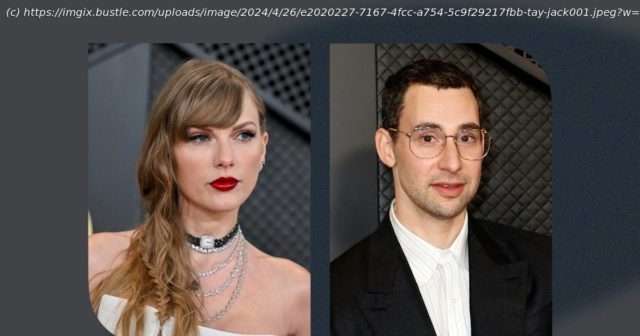Here’s a very subjective ranking of Taylor Swift and Jack Antonoff’s 80 joint songs, based on her lyrics, his production, and Swifties’ emotional connections.
Music
From 1989 to Tortured Poets, the genre-hopping duo has come a long way.
Like peanut butter and jelly, Taylor Swift and Jack Antonoff are a classic pairing. The 11-time Grammy winner started working with the Bleachers lead singer in 2013, and what started with a soundtrack collaboration has grown into one of pop music’s most fruitful partnerships.
As of 2024, Antonoff has co-written and/or co-produced 80 songs with Swift, which was hugely boosted by her latest album, The Tortured Poets Department. While that’s just a fraction of their individual catalogs, they remain each other’s most influential collaborators.
Arguably, the success of their early songs on Swift’s 2014 album, 1989, helped Antonoff grow into a super-producer, leading him to work with Lorde on Melodrama and Lana Del Rey on Norman F*cking Rockwell! He continued collaborating with Swift on every one of her albums since 2014, and won his first two Album of the Year Grammys for 1989 and 2020’s folklore.
Despite this, Swift had never made a record exclusively with Antonoff until her 10th studio album Midnights, which won the pair their third Album of the Year Grammy together.
Clearly, they’re not done just yet, as evidenced by their many songs together on Tortured Poets. To celebrate their growing creative partnership, here’s a very subjective ranking of Swift and Antonoff’s 80 collaborations.
This kiss-off track was a fun finale on her Reputation Stadium Tour. That’s it.
Antonoff lends a wistful touch to this “From the Vault” track for Fearless (Taylor’s Version), but Swift’s 19-year-old instinct to leave this off the proper 2008 album was correct.
Much like Swift and Antonoff’s first soundtrack single, “Sweeter Than Fiction,” her 2016 collaboration with ZAYN for Fifty Shades Darker ended up signaling the sound of her next studio album, 2017’s Reputation. But also like that song, there was much better to come on the album.
Swift elevates a catchy little ditty with a feature from Urban, making it a perfect “Vault” track on Fearless (Taylor’s Version), but it doesn’t stand up to the towering anthems on the main album.
This Tortured Poets track is the first (and so far, only) time where Swift and Antonoff’s signature brand of melodic, twinkly synth-pop feels played out rather than improved upon.
This was where it all started. “Sweeter Than Fiction,” a song written for the long-forgotten film One Chance, marked Swift and Antonoff’s first-ever collab. They laid down a solid blueprint, with Antonoff ramping up his classic ’80s synth-pop production to fit Swift’s sugary sweet lyrics, but little did we know how much more was to come.
This tale of deceit and payback from Swift’s album Midnights may be one of the weirdest tracks in her catalog, but it could’ve been even weirder. If she wanted a Billie Eilish-esque chilling revenge fantasy, she should’ve gone to the source.
In true Swiftian fashion, she begins the chorus by asking if she could ask a question before proceeding to ask several in quick succession. Since Swifties are speculating that she’s asking her ex-boyfriend Harry Styles, he should respond with a song called “Answer…” or something.
Everyone say, “Thank you, Taylor,” for generously planning our next trip to London.
The one part of England that doesn’t get a shoutout on “London Boy” gets its own song instead. Swift envisions a future of her leaving the public eye and traversing the Lake District, much like the poets she idolized. It features some of her poetic and intricate lyrics — and her clunkiest melodies.
Swift’s inability to decide if she wants to rekindle a romance or get revenge makes for a fun and funny addition to her catalog, but it wasn’t worthy of making the standard edition of Tortured Poets.
Never forget how one of Swift’s most poignant and succinct ballads is about Antonoff’s love story with Lena Dunham. Much like their relationship, this song hasn’t withstood the test of time.
Swift originally gave this “From the Vault” track to Sugarland (and sang backup) in 2018 before reclaiming it for Red (Taylor’s Version). Antonoff keeps things surprisingly light, giving the song a distinct pop touch but causing it to lack the emotional impact of Jennifer Nettles’ harrowing pleas.
“Suburban Legends” might be the most Antonoff track that Antonoff has ever Antonoff-ed. Swift helped write the lyrics about star-crossed lovers who just can’t make it work after finding success, but if she hadn’t, Antonoff probably would’ve written and recorded it as a Bleachers song.
This “Vault” track from Speak Now (Taylor’s Version) proves that Swift has been thinking about the negatives of fame for most of her career. Antonoff’s simple yet melacholic production and the Paramore singer, as one of the few women who can relate, only help drive that message home.
The closing track from Lover is almost surprisingly calm and assured for an album that contains Swift’s most epic love stories and brutal tales of loss. Instead of focusing on highs and lows, she connects her present to her past (“I once believed love was red”) and lets it all go.
This Midnights 3 a.m. edition tracks sounds like it could have been a “Vault” track from 1989. But unlike “Welcome to New York,” “Paris” isn’t a romanticized tribute to the city, instead focusing on a whimsical meet-cute that transports you to the City of Love (or in Swift’s case, the City of Lover).
Swift somehow found a way to make football terms, corny jokes, and science references sound sweet and romantic rather than cringey. You can thank Travis Kelce for that.
Co-written with ex-boyfriend Joe Alwyn (under his penname William Bowery), “Sweet Nothing” is Swift’s simplest ode to romance, focusing on pebbles, kitchen humming, and the minutiae of relationships. And that nursery-rhyme melody means the song will never leave your head. Ever.
Speaking of nursery rhymes, the bridge of “Call It What You Want” could be re-written as a lullaby to Swift’s future child. The atmospheric track could also doubled as the story of how she fell in love with that child’s father, if her and Alwyn hadn’t split.
The title track of Swift’s 11th album houses some of her most chaotic lyrics, like “We declared Charlie Puth should be a bigger artist” and “You fall asleep like a tattooed golden retriever.” She somehow makes them sound normal with her dreamy vocals atop Antonoff’s hallmark synths.
Swift begins Midnights with a bang(er), co-written by Zoë Kravitz, that effortlessly calls out speculation about her marital status while harking back to some of the catchiest moments in her and Antonoff’s repertoire. In fact, it carries such a melodic similarity to “I Think He Knows” that Swift hinted at mashing up the two songs on the Eras Tour. (Sadly, this didn’t happen.)
Yes, this song is likely about Kim Kardashian, if you couldn’t guess from the capital letters. But what’s more important is that it’s equally catchy and clever, and continues a storied tradition of popstars hiding their song’s subjects through someone named Amy or Aimee. Poor them.
“I Look In People’s Windows” is Swift and Antonoff’s shortest track, lasting just over two minutes. But between her stories of hopping between houses and his experimental, guitar-led production, it packed a huge punch.
This 1989 deep cut is one of the first examples of Swift and Antonoff’s combined synth-pop powers and her fascination with the middle of the night, two things that would go on to become hallmarks of her next several albums. She always knew how to push our buttons (in a good way).
It’s a marvel that Swift managed to make her commentary on slut-shaming sound just as twinkly and romantic as her and Antonoff’s most dreamy work. Just imagine the headlines that “Slut!” would have made if it had made 1989 back in 2014.
“Now I’m down bad crying at the gym” just might be the most relatable lyric Swift’s ever written. Granted, most people would cry at the gym because working out can be awful, but being hung up over a stupid man is also acceptable.
One of Swift’s most experimental productions, “Glitch” is full of, well, glitches, like fuzzy synths that sound like TV static, loops that could be a Slack notification, and ill-timed interruptions that somehow come together seamlessly.






